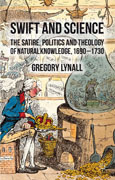
Swift and science: the satire, politics, and theology of natural knowledge, 1690-1730
Lynall, Gregory
It is often thought that Jonathan Swift was vehemently opposed to the new science that heralded the beginning of the modern age, but this book interrogatesthat assumption, bringing new perspectives to his most famous works, and making a case for the intellectual importance of some of his more neglected poems and prose satires. Lynall's study traces the theological, political, and socio-cultural resonances of scientific knowledge in the early eighteenth century, and considers what they can reveal about the growth of Swift's imagination. Taking us to a universe made from clothes, to a place where flowers can talk andmen are only trees turned upside down, to an island that hovers high in the clouds, and to a library where a spider predicts how the world will end, the book shows how satire can be an active and unique participant in cultural debates about the methods and purposes of scientific enquiry. INDICE: List of Illustrations.Acknowledgements.List of Abbreviations.Introduction: Altitudes of Authority.Meditations and Mechanisms: Swift and Robert Boyle's Occasional Reflections upon Several Subjects .Sinking the 'Spider's Cittadel': The Battel of the Books and Thomas Burnet's 'Philosophical Romance' ofthe Earth.Newtonian Battels with Rising Stars and Wheeling Moons.Laputian Newtons: Science, the Wood's Halfpence Affair and Gulliver's Travels .Socinians and Queens: Samuel Clarke and 'Directions for a Birthday Song'.Afterword.Notes.Bibliography.Index.
- ISBN: 978-0-230-34364-1
- Editorial: Palgrave Macmillan
- Encuadernacion: Cartoné
- Páginas: 224
- Fecha Publicación: 20/04/2012
- Nº Volúmenes: 1
- Idioma: Desconocido
